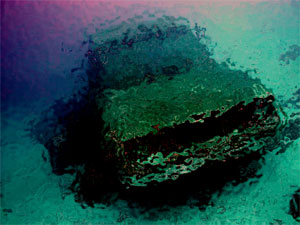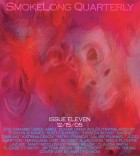It was a clear afternoon when a teenage boy with a new license took a corner on the beach road a bit too fast, and careened into my mother’s car. A clear, spring afternoon when we lost not only my baby sister, Bethie, but the beach, the whole wide ocean as well. At least, that’s how it seemed to my brother and me. Though the sea was less than a mile away, we spent the season cruising through the hot, abandoned neighborhood on our bikes. As one perfect day tumbled into another, we pondered our exile, circling the streets as aimlessly as gulls. We straddled our red and blue Columbias as we watched our neighbors, the Frieds, packing their station wagon with coolers, frayed sand chairs, and bulky flotation devices shaped like whales and dolphins.
Sometimes, we drifted inside to lose an hour or two in daytime TV, but our mother’s overwhelming, drugged grief quickly drove us back to the streets where beach sand mysteriously accumulated on the side of the
road. We sat on the grass and sifted it through our fingers.
We only talked about what had happened once.
“Do you really think she’s in heaven?” I asked my brother. Since he was a straight A student and the school’s very own math genius, I figured he’d know.
“That’s what Father Bertelli said, isn’t it?” Ronan replied, making a thin stream of the sand.
Later, alone in my bed, I closed my eyes and thought about Bethie: the way she smelled after a bath, the feel of her hair when she fell asleep beside me, the sound of her crying in the night. How could she just disappear?
But by the end of that sea-less summer, I nurtured a terrible secret in my chest. It was a powerful secret, kind of like the huge rolling hurricane we watched on the map at the end of the season, certain that the way things were going, it must be heading straight for our house. And almost hoping it would. Almost hoping it would head straight up the coast and crack our besieged home in two.
The secret was so powerful, that one night toward the end of summer it came burbling up in me like the eye of the hurricane. Without turning on a light, I walked straight into Ronan’s room, and climbed into bed with him.
Though I thought he was asleep, I drew great comfort from the sound of his breath, the brush of his body beside me. “You know something?” I said, in a low whisper. “Sometimes I wish Bethie had never been born. What did this family need another kid for anyway?”
Ronan continued to breathe in and out rhythmically on the narrow bed. And in a moment, I, having passed the eye of my personal storm, almost fell asleep beside him. But just as I floated toward oblivion, I felt his hand squeezing mine. “Me too,” he said with a passion I didn’t think his ten year old bones could contain. “Me too.”
It was too dark to see Ronan’s face, but I knew that it was streaked with tears. And he didn’t need a light to see the sorrow that had
punctured my nine year old innocence either. Somehow, that confession, for all its horror, had released our grief for the first time.
It. That was what Ronan and I called the instantaneous occurrence that would forever bisect our family life into before and after. That one blood soaked event which would never be rinsed from our mother’s mind but would rarely be described in any language more specific than “the accident on the beach road.”
It. Later in the tumult of adolescence, we would substitute the same charged word for sex. But that summer, there was only one thing that was so forbidden, mysterious, and unspeakable it could only be described by one pronoun. It. The strange, predatory moment that had swallowed my sister, Bethie, like a tidal wave: majestic, unswerving, breathtakingly indifferent.



 The core workshop of SmokeLong Fitness is all in writing, so you can take part from anywhere at anytime. We are excited about creating a supportive, consistent and structured environment for flash writers to work on their craft in a community. We are thrilled and proud to say that our workshop participants have won, placed, or been listed in every major flash competition. Community works.
The core workshop of SmokeLong Fitness is all in writing, so you can take part from anywhere at anytime. We are excited about creating a supportive, consistent and structured environment for flash writers to work on their craft in a community. We are thrilled and proud to say that our workshop participants have won, placed, or been listed in every major flash competition. Community works.